Debunking the Rohingya crisis, Bangladesh’s role, and the ASEAN Summit
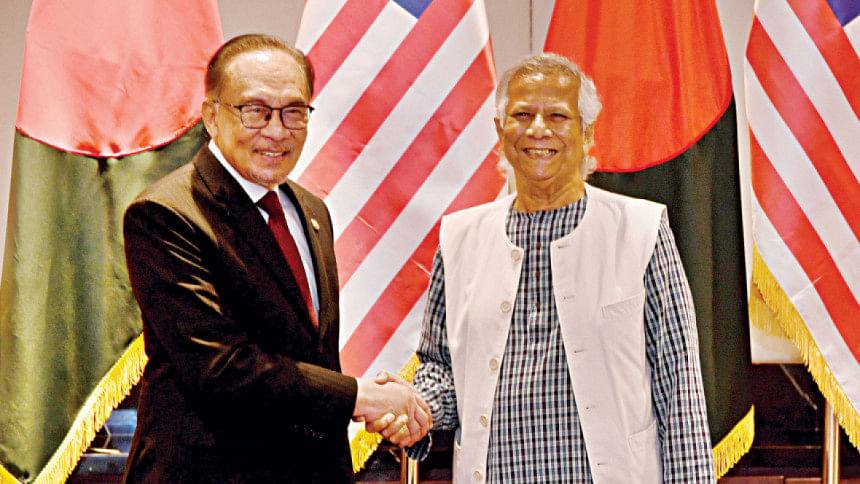
The balance may be shifting. Resolving the Rohingya crisis is being swayed by more external winds than internal thrusts. Dynamics such as Bamar treatment of the Rohingya, humanitarian care of the evicted Rakhine persons, and Bangladesh-Myanmar discussions on repatriating the displaced persons from Cox's Bazar camps have been overtaken by Myanmar's 2021 coup d'etat and its civil war consequences, regional spillovers thickening across Southeast Asia, and an independent resurgence of "democracy" inside Bangladesh, splashing externally.
In reverse order, Bangladesh Chief Adviser Prof Muhammad Yunus is more cited globally today not so much for his trademark microfinance contributions as his democracy-salvaging attempts since the historic ouster of the Awami League regime through a student-led democratic uprising last year. In comparison to Bangladesh's efforts in reviving democracy, Myanmar's deficiency of democracy has emerged more despairingly.
Democracy is a reform movement in deficient countries. The other side of this movement defends the status quo to keep narratives in the same ballpark. Bamars, the largest ethnic group in Myanmar, who represent that "other" Rohingya side, controlled all of Myanmar from Naypyidaw through the Tatmadaw armed forces. Under today's civil war, reportedly, less than one quarter remains in their hands. The National Unity Government (NUG), a mixed group, influences the rest. Its reformers, the National League for Democracy (NLD), a party of former Nobel Peace Prize winner Aung San Suu Kyi, replaced military rule with "democracy" in 2015 and won again in 2020. After a stuttering start, her party was ousted in the February 2021 coup, after the Rohingya malaise spilled over into Bangladesh.
Other NUG members include discriminated ethnic groups in the northeast, north, and northwest. Because of that discrimination, they defend the status quo (their histories, identities, and interests), but support the reformers to evict General Min Aung Hlaing, the coup leader and current State Administration Council chairman. This gap between the local and provincial priorities and the overarching national priority—such as democracy—matters. These ethnic groups include the United League of Arakan (ULA) and its armed faction, the Arakan Army (AA), along Bangladesh and India's eastern borders; Kachin Independence Army (KIA) along China's southern border; Karen National Union (KNU) along Thailand's border; and Ta'ang National Liberation Army (TNLA) and Myanmar National Democratic Alliance Army (MNDAA), both of which function mostly out of Shan state along China's southern border, among others.
Rakhine, the Rohingya home, stands divided between ULA/AA and the Arakan Liberation Party (ALP). The ALP military faction, Arakan Liberation Army (ALA), often collaborates with Naypyidaw's State Administration Council and clashes with the ULA/AA along the Bangladesh borders. They subject the Rohingya people to crossfires in such locations as Buthidaung and Maungdaw, and signal the increasing need for negotiations rather than battleground exchanges to sort local problems.
The growing ULA/AA empowerment gives it greater intra-NUG salience. It has evicted Naypyidaw military forces across Rakhine and finds support from the Organization of Islamic Countries (OIC). Bangladesh unofficially satisfies two ULA/AA conditions for a Rohingya solution: recognition of the ULA/AA, and mobilisation of UN-based global support.
NUG's "reformer"claim is, however, tainted. The 2017 Rohingya eviction was an NLD decision to let China complete its economic corridor across Rakhine and Kyaukphyu port in the Bay of Bengal. Such evictions go back to 1785 for ethnic discrimination, not geopolitics.
Resolving a national crisis, such as Hlaing eviction and Rohingya repatriation without fixing local fissures, weakens any Rohingya solution. Without exogenous platforms and management, this may be impossible given the depth of local distrust. If Myanmar's democracy is to work, attention must shift from one Nobel Prize winner, Aung San Suu Kyi, the 2017 eviction perpetrator, to another, Yunus, whose "democracy" bonds extend to Malaysian Prime Minister Anwar Ibrahim. The Malaysian politician visited Prof Yunus on October 4, 2024, and will host/chair the 46th ASEAN annual summit on May 26-27. That summit's theme of "Inclusivity and Sustainability" cannot but prioritise the Rohingya issue.
Prof Yunus's democratic ideologies pushed Gen Hlaing to announce Myanmar's election this year. This is an ASEAN membership requirement. When Prof Yunus attended the BIMSTEC Summit in Bangkok in April, he articulated his "Three Zeroes" agenda and called on the member-states to promote dialogue between conflicting parties in Myanmar to resolve the Rohingya issue. In a landmark move, Myanmar's Deputy Prime Minister and Foreign Minister U Than Shwe announced an agreement to take back 180,000 Rohingya at the summit—against the 800,000 names Bangladesh proposed even as camp denizens have crossed 13 lakh—as part of repatriating one quarter of a million from Cox's Bazar. So clearly, exogenous platforms help.
Democracy is not a new ASEAN issue since the 2008 ASEAN Charter's preamble emphasised "democracy, law, and good governance." Article 1 targets "strengthening democracy," and Article 2 "democracy principles." Even right after Gen Hlaing's February 2021 coup, ASEAN prepared a five-point consensus to end violence, begin dialogue, not only appoint a special ASEAN envoy to Myanmar but also visit Myanmar, and provide humanitarian assistance. Myanmar's civil war made it irrelevant.
Ever since 2021, ASEAN summits have treated the Rohingya issue. Cambodia's Prime Minister Hun Sen emotionally posted the Rohingya issue when he hosted/chaired the 2022 summit, but his meeting with only Hlaing offended NUG leaders. Indonesia's President Joko Widodo organised many meetings and supplied lots of humanitarian aid, but could not convert sentiments into substance at the 2023 summit. The same thing happened in Laos in January 2024 when the country's foreign minister met Hlaing. Opening that closed Rohingya door becomes more urgent constantly.
Malaysian Prime Minister Anwar Ibrahim faces similar clouds this year. A harsher global context awaits him: a new US administration's tariff policies have deepened ASEAN trade relations with China, widened Myanmar's own policy options and doors, and with India preoccupied in Kashmir, China faces less Southeast Asian constraints. So, the obvious question arises: why break Myanmar's status quo? After all, Myanmar's top foreign investors (particularly China, India, and Japan) remain better off with the status quo. China influences ethnic NUG partners, because of those groups overlapping China's borders, since the country itself remains a stranger to democracy, to push Myanmar in that direction. In short, Malaysia's ASEAN summit this month would toss between these ill winds and the hopes that the vanguards of democracy that Anwar and Yunus symbolise. Riddled with mines, those remain the only salvaging elements for a Rohingya resolution. Without intra- and inter-boundary dialogues, no resolution seems feasible, including any "humanitarian corridor," and when displacement camps only grow, creating such passages misses a crucial beat.
Yunus mobilised another exogenous platform for a Rohingya solution: the UN. Its outgoing secretary-general, António Guterres, not only visited Dhaka, but also shared iftar with nearly 100,000 Rohingya in the Kutupalong camp in March, giving the neglected Rohingya what they most deserve: inclusiveness internationally, on an equal footing, not out of "noblesse oblige."
Bangladesh's exogenous reputation depends upon its endogenous treatment of its own election. Squaring the Rohingya circle fortifies two other global wishes: reformers, particularly the expressive youths who voted in 75 countries in 2024 (the most ever in any one year), shifting to negotiations via more streetside protests; and historically discriminated/persecuted groups replacing survival instincts with betterment. Peace, after all, is the springboard of reforms, and the postulated target of all conflicts, meaning zero-sum insulated approaches beg for collaborative, inclusive, and external counterparts—a shift too historically unprecedented to instantly change the ballgame.
Dr Imtiaz A Hussain is professor at the Department of Global Studies and Governance (GSG) at Independent University, Bangladesh (IUB).
Views expressed in this article are the author's own.
Follow The Daily Star Opinion on Facebook for the latest opinions, commentaries and analyses by experts and professionals. To contribute your article or letter to The Daily Star Opinion, see our guidelines for submission.

 For all latest news, follow The Daily Star's Google News channel.
For all latest news, follow The Daily Star's Google News channel. 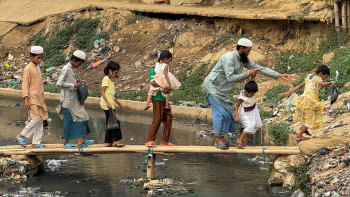
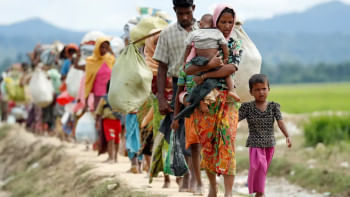




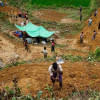




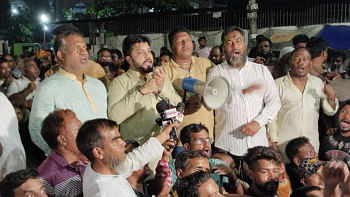
Comments